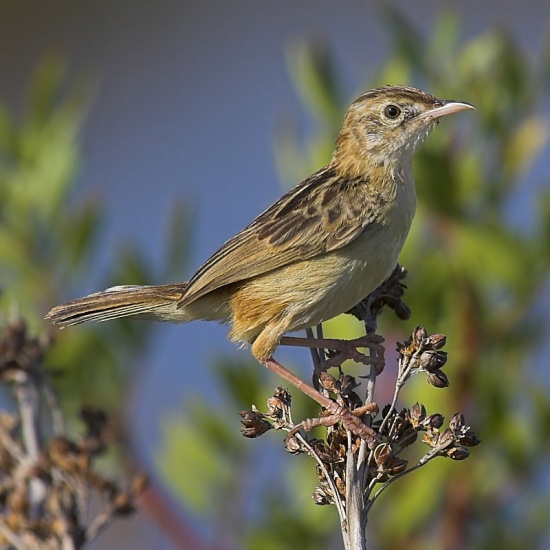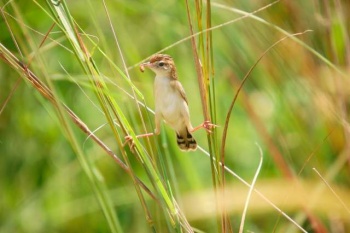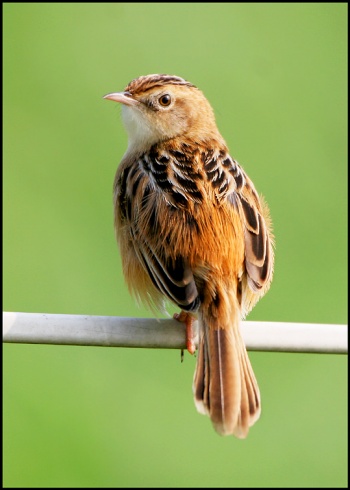(Attempt to disguise some of the copied text. 1 picture changed 2 different views/ssp added. Taxonomy. References) |
(User template amended) |
||
| Line 15: | Line 15: | ||
This genus is sometimes split off with various other southern warbler genera and given family status as the ''[[Cisticolidae]].'' | This genus is sometimes split off with various other southern warbler genera and given family status as the ''[[Cisticolidae]].'' | ||
====Subspecies<sup>[[#References|[1]]]</sup>==== | ====Subspecies<sup>[[#References|[1]]]</sup>==== | ||
| − | [[Image:IMG 5513.jpg|thumb|350px|right|Photo by {{user|M Kwan|M Kwan}}<br />Long Valley, [[Hong Kong]], December 2007]] | + | [[Image:IMG 5513.jpg|thumb|350px|right|Photo by {{user|M+Kwan|M Kwan}}<br />Long Valley, [[Hong Kong]], December 2007]] |
*''C. j. cisticola'': | *''C. j. cisticola'': | ||
:*Coastal western [[France]] to [[Iberian Peninsula]], [[Balearic Islands]] and north-western [[Africa]] | :*Coastal western [[France]] to [[Iberian Peninsula]], [[Balearic Islands]] and north-western [[Africa]] | ||
Revision as of 10:59, 6 September 2009
Alternative name: Fan-tailed Warbler
- Cisticola juncidis
Disambiguation: For the American species Euthlypis lachrymosa, see Fan-tailed Warbler
Identification
10-11cm.
- Sandy-brown above, heavily streaked with black on the mantle
- White underparts
- Short broad, white-tipped tail
Breeding male has a black bill
Distribution
Southern Europe, Africa outside the deserts and rainforest, and southern Asia down to northern Australia.
Taxonomy
This genus is sometimes split off with various other southern warbler genera and given family status as the Cisticolidae.
Subspecies[1]
- C. j. cisticola:
- Coastal western France to Iberian Peninsula, Balearic Islands and north-western Africa
- C. j. juncidis:
- C. j. neuroticus:
- C. j. uropygialis (perrenius):
- C. j. terrestris:
- C. j. cursitans:
- C. j. salimalii:
- South-western India (Kerala)
- C. j. omalurus:
- C. j. malaya:
- C. j. brunniceps:
- Japan (Honshu to Ryukyu, Izu and Cheju-Do islands) to northern Philippines
- C. j. tinnabulans:
- Southern China to Indochina, Hainan, Taiwan and Philippines
- C. j. nigrostriatus:
- South-western Philippines (Culion and Palawan)
- C. j. fuscicapilla:
- Eastern Java, Kangean Islands and Lesser Sundas
- C. j. constans:
- Sulawesi, Togian Island, Muna Island, Tukangbesi Island and Peleng Island
- C. j. normani:
- Coastal southern New Guinea and coastal northern Queensland
- C. j. leanyeri:
- Disjunct in coastal northern Australia to western Gulf of Carpenteria
- C. j. laveryi:
- Coastal north-eastern Queensland (Cape York Peninsula south to Keppel Island)
Habitat
Open land with shrub, damp scrubby grassland, reeds, cane fields, thick brush, mangroves. Grassy coastal plains, saltmarsh etc.
Behaviour
A small Warbler often seen only as a fleeting glimpse as it is a very active little bird. Some subspecies appear to be shier than others.
Nesting
The female builds a cup shaped nest deep in grasses, from living leaves, plant-down, cobwebs, and grass, with a canopy of tied-together leaves or grasses overhead for camouflage. Three to six eggs are laid.
Vocalisation
The male has a most distinctive song-flight. It flies in circles about 20 ft above the ground, undulating considerably. At the top of each arc it gives a sort of 'zit' note.
<flashmp3>Cisticola juncidis (song).mp3</flashmp3>
Listen in an external program
References
- Clements, JF. 2008. The Clements Checklist of Birds of the World. 6th ed., with updates to December 2008. Ithaca: Cornell Univ. Press. ISBN 978-0801445019.
- Wikipedia
- Collins Field Guide 5th Edition
- Collins Bird Guide ISBN 0 00 219728 6
- BF Member observations






